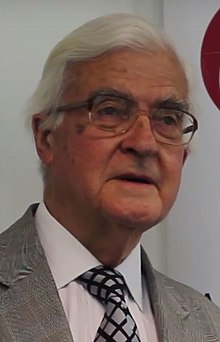Kenneth Baker, Baron Baker of Dorking
|
The Right Honourable The Lord Baker of Dorking CH PC |
|
|---|---|
 |
|
| Lord Temporal | |
|
Assumed office 16 June 1997 |
|
| Home Secretary | |
|
In office 28 November 1990 – 10 April 1992 |
|
| Prime Minister | John Major |
| Preceded by | David Waddington |
| Succeeded by | Kenneth Clarke |
| Chancellor of the Duchy of Lancaster | |
|
In office 24 July 1989 – 28 November 1990 |
|
| Prime Minister | Margaret Thatcher |
| Preceded by | Tony Newton |
| Succeeded by | The Lord Patten of Barnes |
| Chairman of the Conservative Party | |
|
In office 24 July 1989 – 28 November 1990 |
|
| Leader | Margaret Thatcher |
| Preceded by | Peter Brooke |
| Succeeded by | The Lord Patten of Barnes |
| Secretary of State for Education and Science | |
|
In office 21 May 1986 – 24 July 1989 |
|
| Prime Minister | Margaret Thatcher |
| Preceded by | Keith Joseph |
| Succeeded by | John MacGregor |
| Secretary of State for the Environment | |
|
In office 2 September 1985 – 21 May 1986 |
|
| Prime Minister | Margaret Thatcher |
| Preceded by | Patrick Jenkin |
| Succeeded by | Nicholas Ridley |
|
Member of Parliament for Mole Valley |
|
|
In office 9 June 1983 – 2 May 1997 |
|
| Preceded by | Constituency established |
| Succeeded by | Paul Beresford |
|
Member of Parliament for St Marylebone |
|
|
In office 22 October 1970 – 9 June 1983 |
|
| Preceded by | Quintin Hogg |
| Succeeded by | Constituency abolished |
|
Member of Parliament for Acton |
|
|
In office 28 March 1968 – 18 June 1970 |
|
| Preceded by | Bernard Floud |
| Succeeded by | Nigel Spearing |
| Personal details | |
| Born |
3 November 1934 Newport, Monmouthshire |
| Political party | Conservative |
| Alma mater | Magdalen College, Oxford |
Kenneth Wilfred Baker, Baron Baker of Dorking, CH, PC (born 3 November 1934) is a British politician, a former Conservative Member of Parliament and cabinet minister and a life member of the Tory Reform Group.
Born in Newport, Monmouthshire, son of a civil servant, he was educated at what was then Hampton Grammar School, a boys' voluntary aided school in west London (now Hampton School, an independent school) between 1946 and 1948, and thereafter at St Paul's School, a boys' independent school in Barnes, London and at Magdalen College, Oxford, where he graduated in 1958 with a BA Degree in History, and four years later with a MSc degree in International Law and Regulations. He did National Service as an army lieutenant and worked for Royal Dutch Shell before being elected as a Member of Parliament at a by-election in March 1968.
Having unsuccessfully contested Poplar in 1964 and Acton in 1966, Baker was first elected to Parliament when he won Acton at a March 1968 by-election, gaining it from Labour following the suicide of Bernard Floud. However, at the 1970 general election he was defeated by Labour's Nigel Spearing. At an ensuing by-election, held on 22 October 1970—caused by the elevation to the Lords (as a life peer) of Quintin Hogg, so that he could become Lord Chancellor after the surprise Conservative victory at the 1970 election—Baker was elected for the safe Conservative seat of St Marylebone in central London. In the parliamentary seat redistribution of the early 1980s, St Marylebone was abolished and Baker was defeated by Peter Brooke for the Conservative nomination at the nearby new safe seat of Cities of London & Westminster. However he successfully obtained nomination at Mole Valley, a safely-Conservative rural seat in Surrey, which he held until his retirement in 1997. He was succeeded there by Sir Paul Beresford.
...
Wikipedia
